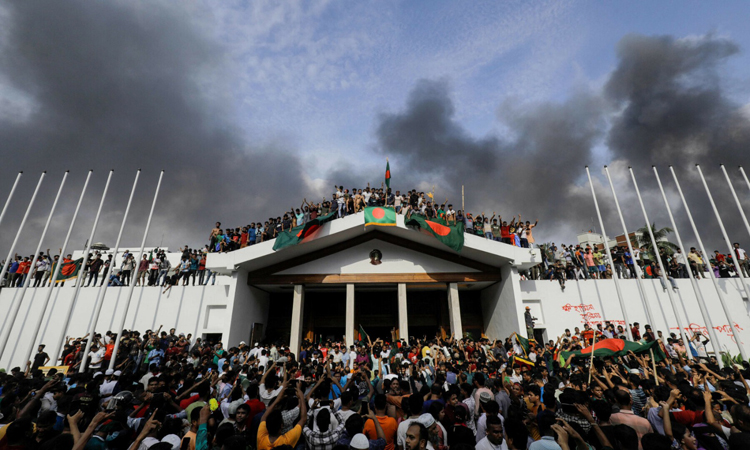 Bangladesh’s army chief Wakeruz Zaman said on Monday he will form an interim government after Prime Minister Sheikh Hasina resigned and fled Dhaka in the face of overwhelming protests.
Bangladesh’s army chief Wakeruz Zaman said on Monday he will form an interim government after Prime Minister Sheikh Hasina resigned and fled Dhaka in the face of overwhelming protests.
“We will form an interim government,” Zaman said in a broadcast to the nation on state television, adding Hasina had resigned.
Since July, Bangladesh has been engulfed by protests and violence that has so far claimed the lives of at least 300 people, according to an AFP tally based on police, government officials and doctors at hospitals.
Protesting student groups have demanded the scrapping of a controversial quota system in government jobs, which escalated into a campaign to seek the ouster of Hasina, who won a fourth straight term in January in an election boycotted by the opposition.
Earlier in the day, students in Bangladesh called for a march to Dhaka in defiance of a nationwide curfew, a day after deadly clashes in the country killed at least 91 people.
Bedecked with medal ribbons on his green fatigues and wearing a four-star general’s cap, Zaman said he was “taking full responsibility” after Hasina was ousted.
“The country is going through a revolutionary period,” said Zaman, 58, who had taken over as army chief only on June 23. Hasina had trusted him because he was a distant relative.
“I give you my word that all the injustices will be addressed,” the career infantry officer said, although it was not immediately clear if he would head the new government.
“The country has suffered a lot, the economy has been hit, many people have been killed – it is time to stop the violence.”
Zaman said he had held talks with leaders of major political parties – excluding Hasina’s long-ruling Awami League – and would soon meet President Mohammed Shahabuddin to discuss the way ahead.
He called for a halt to “all violence in the name of protest” and promised that the new government would ensure justice for all the deaths that took place during the Anti-Discriminatory Student Movement, Bangladesh’s Dhaka Tribune reported.
President Shahabuddin also ordered the release of jailed former prime minister and key opposition leader Khaleda Zia, hours after Hasina was ousted and the military took power.
The president’s press team said in a statement that a meeting led by Shahabuddin had “decided unanimously to free Bangladesh Nationalist Party chairperson Begum Khaleda Zia immediately”.
“The meeting has also decided to free all the people who have been arrested during the student protests,” the statement added. Bangladesh’s military said it would lift a curfew imposed to quash protests at dawn on Tuesday.
“Offices, factories, schools, colleges … will be open” from 6am on Tuesday (0000 GMT), the military said in a statement. On Saturday, the army chief had told officers that the military “always stood by the people”, according to an official statement.
Earlier, the Bangladesh army had urged everyone to obey the curfew rules. “The Bangladesh army will perform its promised duty in line with the Bangladesh constitution and existing laws of the country,” it said in a statement late on Sunday.
“In this regard, the people are requested to abide by the curfew as well as give full cooperation to this end,” it said, adding that the curfew was imposed to ensure the security of people’s lives, properties, and important state establishments.
The military declared an emergency in January 2007 after widespread political unrest and installed a military-backed caretaker government for two years.
India’s ANI news agency said Hasina, 76, landed at the Hindon Air Base, a military airfield near Delhi, after she had earlier today fled Bangladesh. Reuters could not immediately verify this, but commercial tracking services showed a Bangladesh Air Force plane leaving the country and flying west before it disappeared.
Citing sources, ANI reported that India’s National Security Adviser Ajit Doval and senior military officers met Hasina at the airfield and she was being moved to a safe location. A top-level source said she wanted to “transit” on to London, but calls by the British government for a UN-led investigation into “unprecedented levels of violence” put that into doubt.
Hasina had left the country for her own safety at the insistence of her family, her son Sajeeb Wazed Joy told the BBC World Service. Hasina was “so disappointed that after all her hard work, for a minority to rise up against her”, Joy said. She would not attempt to mount a political comeback, he said. He said she had transformed Bangladesh from a “failing state” to “one of the rising tigers of Asia”. “She’s very disappointed,” he said.